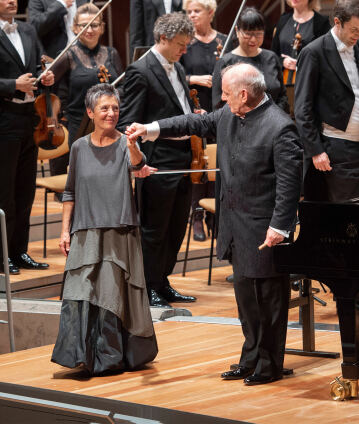Daniel Barenboim and Maria João Pires

A great friend of the Berliner Philharmoniker celebrates an important anniversary: Daniel Barenboim conducted the orchestra for the first time 50 years ago. The programme of that concert can now be heard again, with works by Haydn, Beethoven and Schumann which trace the development from Viennese Classicism to the rapturous era of Romanticism. The soloist in Beethoven’s Piano Concerto No. 4 is Maria João Pires.
For Daniel Barenboim, the concerts are of special significance: on 14 and 15 June 1969, he directed the orchestra for the first time. The same works were on the programme on that occasion as on these evenings. The soloist in Ludwig van Beethoven’s atmospherically intense Fourth Piano Concerto was then Clifford Curzon. This time, Maria João Pires takes is the soloist, standing in for Radu Lupu who is unfortunately indisposed.
The concerts will open with Symphony No. 95 in C minor by Joseph Haydn, who was acclaimed by the London Gazetteer and New Daily Advertiser in early 1785 as the “Shakespeare of music”. The work, which was probably presented for the first time at the Hanover Square Rooms on 29 April 1791, reflected the ideas of grandeur, magnificence and majesty that Haydn’s English contemporaries associated with his music. The opening bars of this “New Grand Overture”, as the symphony was advertised on the playbill, already begin with a grand gesture that seems to shout “curtain up!” or “attention!” to the audience. The striking unison motif has scarcely resounded, however, before it ends in a general pause. The incredibly varied music that follows is also astonishing, since Haydn was trying to “surprise the public with something new and make a brilliant debut”. This was the composer’s comment to his first biographer, Georg August Griesinger, as to why he repeatedly broke aesthetic norms with intellectual calculation.
Robert Schumann’s Fourth Symphony is on the programme after the interval, a work which did not achieve the hoped-for success at its premiere in Leipzig on 6 December 1841. Schumann set the symphony aside for almost exactly ten years, then revised it so substantially in December 1851 that a new score became necessary. The Düsseldorf premiere of the revised version was greeted with enthusiasm, which Schumann explained thus to his friend Johann Verhulst: “In any case I have completely reorchestrated the symphony, and frankly it is much better and more effective than before.”
© 2019 Berlin Phil Media GmbH
Related interviews
Artists
Our recommendations
- A Mozart evening with Trevor Pinnock and Maria João Pires
- 2003 Europakonzert from Lisbon with Pierre Boulez and Maria João Pires
- Herbert Blomstedt and Maria João Pires
- Daniel Barenboim conducts the Berliner Philharmoniker at the Staatsoper Unter den Linden
- Daniel Barenboim and Martha Argerich
- Daniel Barenboim and Yefim Bronfman perform Brahms’s Piano Concerto No. 1